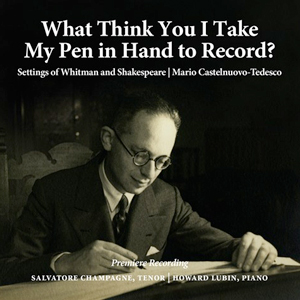by Jeremy Reynolds

Released March 11, 2016, on the Oberlin Music label, the 70-minute disc by two musicians who hold teaching positions at the Oberlin Conservatory of Music is a fascinating exploration of some of the Italian-American composer’s art songs.
The first half of What Think You is a song cycle based on poems by Walt Whitman. The second half is made up of settings of Shakespeare sonnets. All of the lyrics are in English, an unorthodox linguistic choice for a composer whose native tongue is the more mellifluous Italian. But Castelnuovo-Tedesco nurtured a lifelong fascination with the transparency and consonants of the English language, as well as with Shakespeare’s iambic rhythms. The composer’s settings of both Whitman and Shakespeare are stylistically simple, graceful, and devoid of ornamentation or pomp.
As are Champagne’s and Lubin’s performances. Their collaboration is tight, their musical decisions unaffected. Champagne’s diction is impeccable if occasionally a bit percussive, though this is likely a result of the poetry. His tenor has a pleasant fullness and weight. It rarely feels heavy. Songs like We Two Boys Together Clinging and A Glimpse (both on Whitman poems) are nimble, and Champagne handles them easily. Lubin’s playing is strong, particularly in Sometimes with One I Love (Whitman), Shall I compare thee to a summer’s day? (Shakespeare, of course), and When in the chronicles of wasted time (also Shakespeare).
In an album made up exclusively of a single composer’s music, pieces can tend to blur together, and this is the case with What Think You. While Champagne’s and Lubin’s interpretations are delightful for their simplicity and intimacy, there are few moments that stand out above others.
Included in the book are essays by James Westby (Castelnuovo-Tedesco’s biographer), Mila De Santis (a professor at the University of Florence), Aloma Bardi (Italian-born U.S. musicologist, music historian, and translator), and John Champagne (professor of English at Penn State, Erie, and Salvatore’s brother). While the CD book could have benefited from ordering the text of the sonnets according to the recorded tracks, this is a minor quibble. Paired with the music, these writings — alongside beautiful images of the composer and important documents in his career — provide for a genuinely enjoyable foray into this Italian-American composer’s life and work.
Published on ClevelandClassical.com November 14, 2016.
Click here for a printable copy of this article



